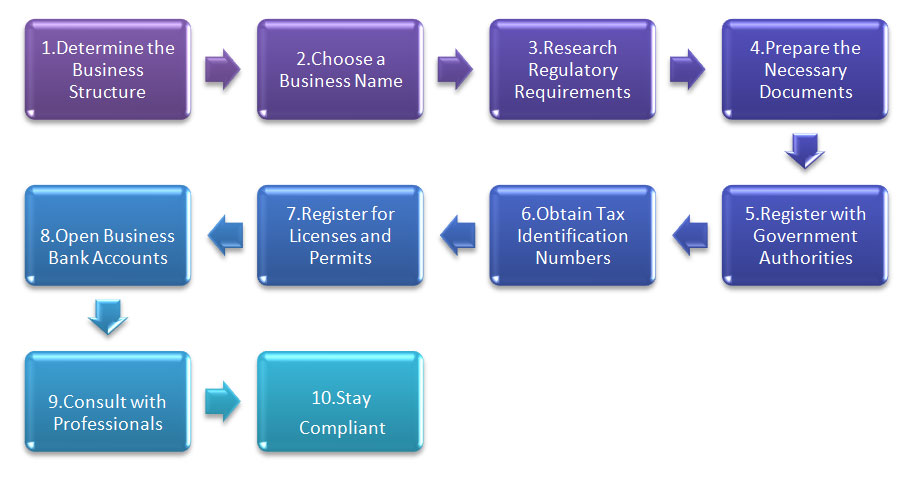Understanding Startups and their Importance
A startup is a newly established business venture that aims to introduce innovative products, services, or solutions to the market. Startups are driven by entrepreneurs who seek to create and grow a business from the ground up, often with limited resources and a high degree of uncertainty.
The primary goal of a startup is to achieve rapid growth and scalability within a relatively short period. Startups often target untapped markets, disrupt existing industries, or address unmet needs with their innovative offerings. They operate in dynamic environments and navigate through challenges such as market validation, competition, funding, and regulatory compliance.
One of the defining characteristics of startups is their emphasis on innovation. They strive to introduce new ideas, technologies, or business models that differentiate them from traditional businesses. Startups leverage advancements in technology, changing consumer behavior, or emerging trends to create a competitive advantage and capture market share.
START-UP INDIA SCHEME
Start-up India Scheme is a flagship initiative of the Government of India, intended to build a strong Eco-system for nurturing innovation and Start-ups in the country that will drive sustainable Economic growth and generate large scale employment opportunities. Start-up India Scheme is Implemented through the Department of Industrial Policy & Promotions (DIPP), Government of
India.A business will be recognised as a ‘Start-up’ under this scheme only after obtaining a Certificate of Registration from Start-up India Hub.
FEATURES OF STARTUPS
- INNOVATION
- SCALABILITY
- ENTREPRENEURIAL CULTURE
- FUNDING
- MARKET DISRUPTIO
- HIGH-GROWTH POTENTIAL
- FLEXIBILITY AND AGILITY
1. Innovation: Start-ups often introduce novel ideas, technologies, or business models that differentiate them from traditional businesses. They seek to address unmet needs, solve problems, or create new opportunities through innovative approaches.
2. Scalability:Start-ups have the potential for rapid growth and scalability. They aim to expand their operations, customer base, and revenue significantly within a relatively short period. This scalability is often driven by leveraging technology, scalability of business models, or the ability to tap into new markets.
Risk and Uncertainty:Startups operate in an environment of uncertainty and risk. They face challenges such as market validation, competition, funding, and regulatory hurdles. Entrepreneurs and startup teams must be willing to take calculated risks and adapt quickly to changing circumstances.
3. Entrepreneurial Culture:Start-ups often have a strong entrepreneurial culture characterized by a high degree of creativity, agility, and a willingness to challenge the status quo. They foster a culture of experimentation, learning from failures, and embracing change.
4. Funding:Start-ups typically require external funding to fuel their growth and development. They may seek investments from venture capitalists, angel investors, crowd funding platforms, or government grants. Funding is crucial for product development, marketing, hiring talent, and scaling operations.
5. Market Disruption:Start-ups often aim to disrupt or revolutionize traditional industries by offering innovative solutions or challenging established players. They leverage technology, changing consumer behavior, or market inefficiencies to create a competitive advantage and capture market share.
6. High-Growth Potential:Unlike small businesses that may focus on sustainability and steady growth, startups aim to achieve exponential growth. They target large markets and seek to capture a significant share of those markets through rapid expansion and scaling.
7. Flexibility and Agility:Start-ups are known for their ability to adapt quickly to market changes, customer feedback, and evolving trends. They have the flexibility to pivot their business models, strategies, or product offerings based on feedback and market demands.
BENEFITS OF STARTUPS

1. Innovation and Disruption:Start-ups are at the forefront of innovation, driving progress and technological advancements. They introduce new ideas, products, and services that disrupt traditional industries, challenging established players and promoting market competition. This innovation spurs economic growth and fosters a culture of continuous improvement.
2. Job Creation:Start-ups are significant contributors to job creation. As they grow and scale, they require a diverse range of talent, leading to the creation of new job opportunities. Startups often provide employment to young professionals, contribute to local economies, and stimulate job market dynamism.
3. Economic Growth and Wealth Creation:Startups can have a significant impact on economic growth and wealth creation. Successful startups generate revenue, pay taxes, and contribute to the overall GDP of a country or region. Additionally, they attract investments, promote entrepreneurship, and inspire the formation of new businesses, creating a ripple effect throughout the economy.
4. Flexibility and Agility:Start-ups are typically nimble and adaptable, able to respond quickly to market changes and customer feedback. This flexibility allows them to pivot their strategies, refine their offerings, and stay ahead of the competition. Their agility enables them to seize emerging opportunities and navigate challenges more efficiently.
5. Technological Advancements:Many start-ups leverage technology as a core aspect of their business models. They drive technological advancements, develop innovative solutions, and push the boundaries of what is possible. These advancements often have wide-ranging societal benefits, improving efficiency, convenience, and quality of life.
6.Social Impact and Sustainability:Startups are increasingly focusing on addressing social and environmental challenges. They develop solutions for renewable energy, healthcare, education, sustainability, and other pressing issues. Socially conscious startups aim to make a positive impact on society and contribute to a more sustainable future.
ELIGIBILITY CRITERIA FOR START-UP RECOGNITION
1. The Start-up should be incorporated as a private limited company or registered as aPartnership firm or a limited liability partnership. An entity shall be considered as a start-up upto 10 years from the date of its incorporation.
2. Turnover should be less than INR 100 Crores in any of the previous financial years.
3. The Start-up should be working towards innovation/improvement of existing products, services and processes and should have the potential to generate employment/ create wealth. An entity formed by splitting up or reconstruction of an existing business shall not be considered a "Start-up".
START-UP INDIA: 80 IAC TAX EXEMPTIONS
Post getting recognition a Start-up may apply for Tax exemption under section 80 IAC of the Income Tax Act. Post getting clearance for Tax exemption, the Start-up can avail tax holiday for 3 consecutive financial years out of its first ten years since incorporation.
Eligibility Criteria for applying for Income Tax exemption (80IAC):
a. The entity should be a recognized Start-up.
b. Only Private limited or a Limited Liability Partnership is eligible for Tax exemption under Section 80 IAC.
c. The Start-up should have been incorporated after 1st April, 2016.
Start-up India: Tax Exemption under Section 56 of the Income Tax Act (Angel Tax)
Eligibility Criteria for Tax Exemption under Section 56 of the Income Tax Act:
a. The entity should be a DPIIT recognized Start-up.
b. Aggregate amount of paid-up share capital and share premium of the Start-up after the proposed issue of share, if any, does not exceed INR 25 Crore
GENERAL START UP REGISTRATION PROCESS

1. Determine the Business Structure: Choose the legal structure for your startup, such as a sole proprietorship, partnership, limited liability company (LLC), or corporation. Each structure has different implications in terms of liability, taxes, and management.
2. Choose a Business Name: Select a unique and suitable name for your startup. Ensure it complies with any naming rules and regulations in your jurisdiction. Conduct a thorough search to make sure the name is available and not already in use.
3. Research Regulatory Requirements: Familiarize yourself with the regulatory requirements specific to your industry and location. Determine what licenses, permits, or certifications may be necessary to legally operate your start-up.
4. Prepare the Necessary Documents: Gather the required documents for registration. These may include identification documents, proof of address, business plan, partnership agreements (if applicable), and any other documents required by your jurisdiction.
5. Register with Government Authorities: Register your startup with the relevant government authorities responsible for business registration. This might be a local or national agency, such as the Registrar of Companies or the Small Business Administration. Submit the necessary forms and pay any registration fees.
6. Obtain Tax Identification Numbers: Register for tax purposes and obtain the necessary tax identification numbers. This may include an Employer Identification Number (EIN) or a value-added tax (VAT) number, depending on your jurisdiction and business activities.
7. Register for Licenses and Permits: Apply for any required licenses and permits specific to your industry. This can include professional licenses, health permits, zoning permits, or industry-specific certifications. Ensure compliance with all applicable regulations.
8. Open Business Bank Accounts: Open a separate bank account for your startup to keep personal and business finances separate. This helps with accurate accounting, tax reporting, and financial management.
9. Consult with Professionals: Consider seeking advice from professionals such as lawyers, accountants, or business consultants who can guide you through the registration process and ensure compliance with legal and regulatory requirements.
10. Stay Compliant: Once registered, it is important to stay compliant with ongoing obligations, such as filing annual reports, renewing licenses, and meeting tax obligations. Stay updated with any changes in regulations that may affect your startup.
FAQS
Q.1. What is a startup?
Ans: A startup is a newly established business venture focused on growth and innovation.
Q.2. How long does startup registration take?
Ans: The duration varies, but it can take a few weeks to several months.
Q.3. What is the difference between a startup and a small business?
Ans: Startups are typically characterized by their focus on innovation, high growth potential, and scalability. They often aim to disrupt industries or introduce new products/services. Small businesses, on the other hand, tend to have a more localized scope, stable growth, and a focus on sustainability.
Q.4. Do I need to register a startup if I'm a sole proprietor?
Ans: In many jurisdictions, sole proprietors are required to register their business name or operate under their personal name. However, the specific requirements can vary, so it's important to check the regulations in your jurisdiction.
Q.5. Can I register a startup online?
Ans: Yes, many jurisdictions offer online registration portals that allow entrepreneurs to register their startups electronically. This simplifies the process and makes it more convenient.
Q.6. Can I start a startup while still employed full-time?
Ans: It's possible, but ensure you review your employment contract and legal obligations regarding non-competes and conflicts of interest.
Q.7. What are the common challenges faced by startups?
Ans: Challenges can include market validation, funding limitations, competition, hiring talent, scaling operations, and adapting to changing market conditions.
Q.8. Can I run a startup without prior entrepreneurial experience?
Ans: Yes, many successful entrepreneurs started without prior experience. Surround yourself with mentors, advisors, and a supportive network to enhance your chances of success.
Q.9. Where can I find funding for my startup?
Ans: Look for venture capital firms, angel investors, crowd funding platforms, government grants, or startup incubators/accelerators.
Q.10. How can I protect my startup's intellectual property?
Ans: Consult an IP attorney to explore options like patents, trademarks, copyrights, and trade secrets for protecting your innovations.
For any consultancy in the Start-up registration||
Contact 7840071184/ 8505999955/ info@ngandassociates.com

